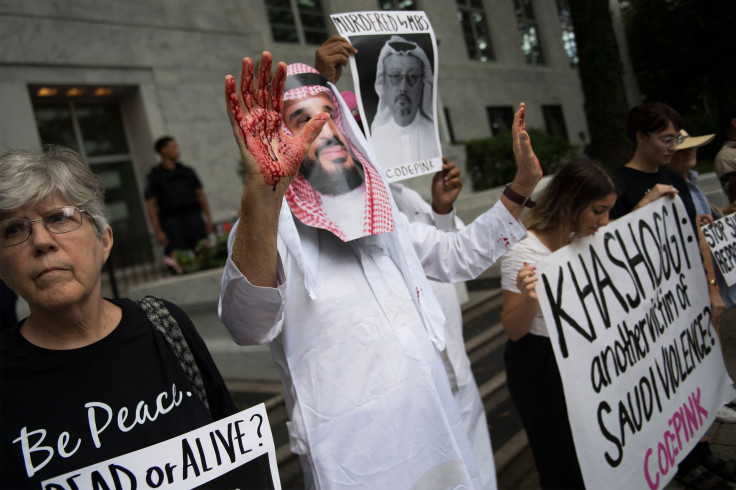Jamal Khashoggi Disappearance: Trump Reluctant To Halt Saudi Arms Deal

President Donald Trump on Wednesday seemed reluctant to halt further arms deal with Saudi Arabia even as he faced increasing pressure to respond to the disappearance of journalist Jamal Khashoggi and said calling off the deal could "hurt" the United States.
“That would be hurting us," he said about halting arms sales to Saudi, according to a report in Economic Times. "We have jobs, we have a lot of things happening in this country. We have a country that's doing probably better economically than it's ever done before. Part of that is what we're doing with our defense systems and everybody's wanting them. And frankly, I think that that would be a very, very tough pill to swallow for our country. I mean, you're affecting us and, you know, they're always quick to jump that way."
It may be noted that in May 2017, Trump and Saudi Arabia's King Salman bin Abdulaziz Al Saud signed an agreement that allowed the Arab nation to purchase arms from the U.S. totaling $110 billion. In March this year, the U.S. State Department approved the sale of an estimated $670 million in anti-tank missiles to Saudi.
Earlier on Wednesday, Trump increased pressure on Saudi Arabia to provide information on Khashoggi. The journalist disappeared last week after visiting the Saudi consulate in Turkey.
"We're demanding everything," Trump said. "We want to see what's going on. It's a very serious situation for us and for this White House... We want to get to the bottom of it."
According to a report in Time, a bipartisan group of U.S. senators is forcing the Trump administration to investigate the disappearance. This could lead to a human rights probe that could result in sanctions against Saudi officials and entities.
“The recent disappearance of Saudi journalist and Washington Post columnist Jamal Khashoggi suggests that he could be a victim of a gross violation of internationally recognized human rights,” the letter said. “Our expectation is that in making your determination you will consider any relevant information, including with respect to the highest ranking officials in the government of Saudi Arabia.”
A Washington Post report said U.S. intelligence was aware of Saudi Arabia’s earlier plans to detain Khashoggi and it raised questions on whether the Trump administration should have warned the journalist, a U.S. citizen, about the danger.
According to a directive signed in 2015, intelligence agencies have a “duty to warn” people, regardless of whether the person is a U.S. citizen, who might be kidnapped, seriously injured or killed.
A former intelligence official said, “Duty to warn applies if harm is intended toward an individual,” adding the duty is dependent on whether the intelligence clearly indicated the person was in danger.
“Capturing him, which could have been interpreted as arresting him, would not have triggered a duty-to-warn obligation,” he said. “If something in the reported intercept indicated that violence was planned, then, yes, he should have been warned.”
“Though I cannot comment on intelligence matters, I can say definitively the United States had no advance knowledge of [Khashoggi’s] disappearance,” deputy State Department spokesman Robert Palladino said Wednesday.
Turkish officials earlier claimed the journalist was killed after he entered the Saudi Consulate in Istanbul. They released video surveillance footage of Khashoggi entering the consulate on the afternoon of Oct. 2.
His whereabouts after that remain unknown as there is no footage of him leaving the consulate and if he is killed, his body has not been found yet. However, the allegation was dismissed by the Saudi government.
"Is it possible for there to be no camera systems at the Saudi Arabia consulate, where the event took place?," Turkish President Tayyip Erdogan said, according to a report in Reuters. "We are investigating all aspects of the event. It is not possible for us to remain silent regarding such an occurrence, because it is not a common occurrence.”
"It's a terrible thing and it certainly would not be a positive," Trump said about Kashoggi's disappearance, adding, "so far it is certainly looking a little bit like that [murder]."
Footage from Turkish TV of alleged #JamalKhashoggi Saudi assassination team entering into Turkey on private jet, going to, and leaving, Saudi consulate in Istanbul, last Tuesday. Note black van. pic.twitter.com/yU2LgBrbHY
— WikiLeaks (@wikileaks) October 10, 2018
A pro-government Turkish daily Wednesday published preliminary evidence from an investigation which identified a 15-member Saudi intelligence team connected to the disappearance, the Straits Times reported.
The disappearance raised tension in the relations between Turkey and Saudi, which was already strained after Ankara sent troops to the Gulf state of Qatar last year to show its support to the latter.
The Washington Post report said Mohammed bin Salman, the crown prince of Saudi Arabia, ordered the operation targeting Saudi Journalist Jamal Khashoggi. According to U.S. intelligence intercepts of Saudi Arabian officials, the prince was behind the plan to lure Khashoggi back to Saudi Arabia from his home in Virginia and then detain him. The report further implicated the Saudi regime for the disappearance of the journalist since Oct. 2.
Khashoggi was a prominent critic of the prince and the Saudi government. The journalist's friends said some senior Saudi officials close to the crown prince called Khashoggi over the past four months offering him protection, and even a high-level government job if he returned to his home country.
Khashoggi was skeptical of the offers and said the government would never make good on their promise to not hurt him, they said.
“He said: ‘Are you kidding? I don’t trust them one bit,’ ” Khaled Saffuri, an Arab American political activist, said while recounting a conversation he had with Khashoggi in May. Khashoggi had just received a call from Saud al-Qahtani, an adviser to the royal court before talking to Saffuri.
© Copyright IBTimes 2025. All rights reserved.





















